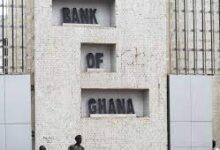
The country’s economic outlook for 2022 is positive although, there are some potential risks which should be closely monitored, Governor of the Bank of Ghana, Dr Ernest Addison, has said.
He said uncertainties surrounding food prices, petroleum price adjustments, and the potential second-round effects of these were likely to exert inflationary pressures in the outlook.
Dr Addison made the observation at the 2021 Bankers’ Week dinner of the Chartered Institute of Bankers held on Friday on the theme “The Digital Economy of Ghana – The Strategic Role of the Banking Industry”.
He said the steady economic recovery from the pandemic effects since the last quarter of 2020 continued into 2021, saying the Bank’s measure of economic activity (the Composite Index of Economic Activity) recorded an annual growth of 11.2 per cent in September, compared with 10.8 per cent and 4.2 per cent in the same periods of 2020 and 2019, respectively.
“We have seen strong growth and rebound in domestic VAT collections, industrial consumption of electricity, port activity, imports, and air-passenger arrivals. This sustained rebound in economic activity is underpinned by turnaround in both consumer and business sentiments, driven by perceived improvements in economic prospects, although consumers expressed some concerns about current household finances,” he said.
On the external front, Dr Addison said Ghana’s external position had continued to remain strong, despite a narrowing of the trade surplus as the economy recovered and imports increased.
He said production of key export commodities, cocoa and gold, remained firm although oil output fell behind projections.
“At the same time, higher services outflows continued, resulting in a widening of the current account deficit to US$1.9 billion, compared with US$1.2 billion in 2020.”
“ The above notwithstanding, the still supportive policy environment and the effective manner in which the government managed the coronavirus allowed confidence to remain strong in the Ghanaian economy, resulting in higher inflows from foreign direct investments, portfolio flows, in addition to the IMF SDR allocation. All these put together led to a balance of payments surplus of US$1.7 billion, higher than the US$334 million surplus recorded a year ago,” Dr Addison said.
He said these developments supported the build-up of international reserves to US$10.8 billion (equivalent to 4.9 months of import cover) in October 2021 from US$8.6 billion 5 (representing 4.0 months of import cover) at the end of December 2020, and provided enough cushion in the foreign exchange market as demand pressures from corporates, importers, and offshore investors increased since October 2021.
Touching on the banking sector, the Governor said the sector had been significantly transformed following recapitalization and comprehensive regulatory reforms.
“The reforms repositioned banks with strong capital buffers before the 2020 COVID-19 pandemic hit. After the shock, the Bank granted macro-prudential regulatory reliefs to ease liquidity constraints within the financial sector. To a large extent, these supportive policies, together with stringent supervision and regulation, ensured that the banking sector remained sound and well-capitalised with strong growth in total assets, investments and deposits, despite the challenging pandemic environment,” Dr Addison said.
BY KINGSLEY ASARE




